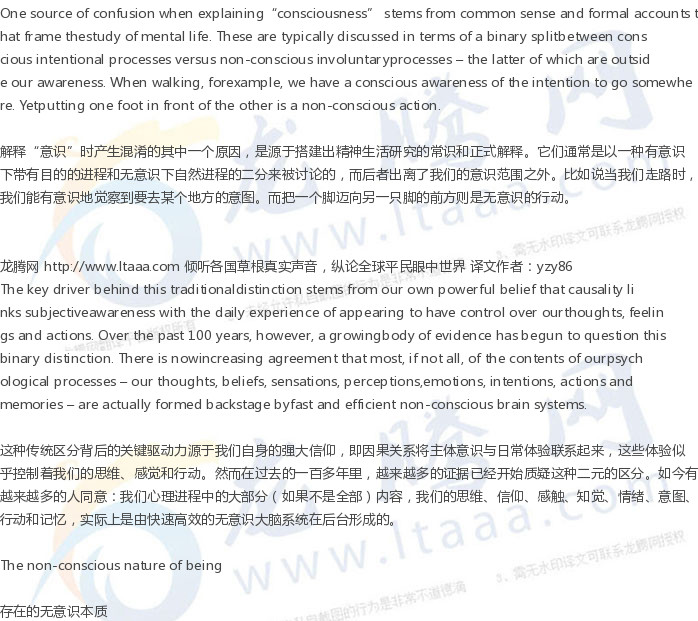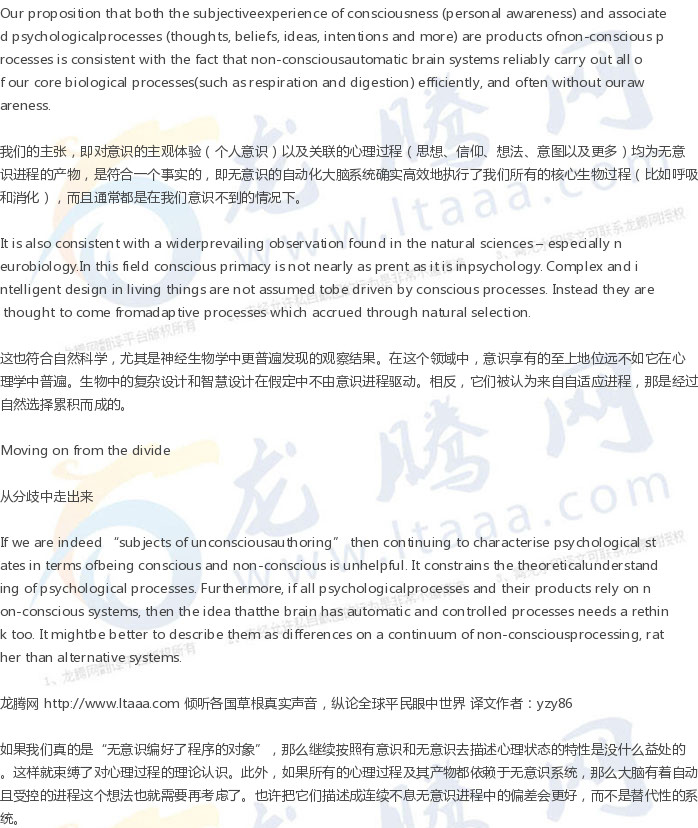【英国】如果意识只是我们无意识大脑的产物呢? [美国媒体]
正如用来描述它的词汇都被“无数条舌头给磨光了”,意识是一个容易产生混淆的话题。我们都知道有意识是什么。基本上,它就是意识到这个世界并对其作出反应。近似地,关于意识如此运作我们也都有常识上的概念。
本文作者神经心理学教授Peter Halligan和心理学荣誉教授David A Oakley分别来自英国卡迪夫大学和伦敦大学学院(UCL)
As the very word used to describe it hasbeen “worn smooth by a million tongues”, consciousness is a fertile topic forconfusion. We all know what it is to be conscious. It is, basically, beingaware of and responding to the world. Similarly, we all possess a common sensenotion of how consciousness works.
正如用来描述它的词汇都被“无数条舌头给磨光了”,意识是一个容易产生混淆的话题。我们都知道有意识是什么。基本上,它就是意识到这个世界并对其作出反应。近似地,关于意识如此运作我们也都有常识上的概念。
But common sense can be easily confused.Consider these questions for example: if you felt pain in an amputated leg,where is the pain? If you say it is in your head, would it be in your head ifyour leg had not been amputated? If you say yes, then what reason have you forever thinking you had a leg?
但常识是很容易混淆的。比如说,让我们考虑一下这些问题:如果你那条被截肢的腿让你感到痛,这痛是在哪里?如果你说那在你的头脑中,那如果你的腿没有被截掉,那痛还会在你的头脑中吗?如果你的答案为是,那么你有什么理由认为你有一条腿呢?
Previously, we argued that while undeniablyreal, the “experience of consciousness” or subjective awareness is preciselythat – awareness. No more, no less. We proposed that while consciousness iscreated by brain systems, it has no causal relationship with or control overmental processes. The fact that personal awareness accompanies the contents ofthe personal narrative is causally compelling. But it is not necessarilyrelevant to understanding and explaining the psychological processesunderpinning them.
虽然其真实不可否认,在此之前我们认为“对意识的体验”或主体意识就只是意识而已。不多,也不少。我们提出,虽然意识是由大脑系统创造出来的,它并不控制心理过程,与之也没有因果关系。个人意识伴随着个人叙事的内容发生,这在因果上是令人信服的。但这不一定能拿来理解并解释那些支撑它们的心理进程。
This quote from George Miller – one of thefounders of cognitive psychology – helps explain this idea. When one recallssomething from memory, “consciousness gives no clue as to where the answercomes from; the processes that produce it are unconscious. It is the result ofthinking, not the process of thinking, that appears spontaneously inconsciousness”.
这段引自认知心理学创始人之一乔治•米勒的文字帮助解释了这个想法。当一个人从记忆中回想起些什么的时候,“意识对于这个答案从哪里冒出来是没有头绪的;产生它的这些过程是无意识的。它是思考的结果而非思考的过程,在意识中自发出现。”
Taking this further, we propose, thatsubjective awareness – the intimate signature experience of what it is like tobe conscious – is itself a product of non-conscious processing. Thisobservation, was well captured by pioneering social psychologist Daniel Wegnerwhen he wrote that, “unconscious mechanisms create both conscious thought aboutaction and the action, and also produce the sense of will we experience byperceiving the thought as the cause of the action”.
我们更进一步地提出,主体意识,即关于有意识状态的标志性私密体验本身就是无意识进程的产物。社会心理学家先驱丹尼尔•魏格纳很好地捕捉到了这种观察,他写道,“无意识机制既创造出了有意识的关于行动的思考和这个行动,也通过察觉到这种作为行动起因的想法,产生了我们体验到的意志的感觉”。
Such a proposal does not dispense with thecommon sense reality of one’s personal qualitative experience, nor with theprevious findings of cognitive neuroscience. However, it offers an opportunityto reduce some of the confusion that comes with use of the terms“consciousness” and “contents of consciousness”. Both of which continue toimply that consciousness has a functional role in distinguishing psychologicalprocesses.
这个提法没有忽略属于常识的现实中足以用来定性的个人体验,也没有忽略认知神经科学之前的发现。然而,它提供了一个机会,能去减少使用“意识”和“意识的内容”等术语时发生的混淆。这两个术语都暗示了意识在其有别于其他的心理进程中,起到了功能性的作用。
1、There is no suchthing as consciousness. It isn’t anywhere and doesn’t do anything. The factthat we are complex perceivers that can distinguish different types ofperception and the fact that we sometimes don’t perceive does not makes anexistence out of consciousness don’t. Consciousness is not a product and ismost assuredly not the product of the brain.
不存在意识这种东西。它不存在于任何地方,也干不了任何事。事实是,我们是复杂的感知者,能够区分不同类型的知觉,我们有时候会感知不到的事实,不代表意识之外的某种存在也感知不到。意识不是一种产物,而且最容易确定的是,它不是大脑的产物。
There is no clear distinction betweenconscious and non conscious perception.
在有意识感知和无意识感知之间不存在明确的差别。
We correctly express experience as “Iperceive X” where ‘I’ is the object that perceives and perception is a realprocess.
我们用“我感知到了X”来正确地表达体验,其中“我”是那个去感知的物体,而感知是一个真实的过程。
So, given that consciousness must arisefrom non conscious processes the real question is how this creates theexperience of self awareness. How is our own consciousness different from someautomaton that generates a log of its internal processes?
那么,鉴于意识必须产生于无意识过程中,真正的问题是,这如何就产生了自我意识。我们自身的意识和一些能产生内部进程日志的机器人有什么不同?
4、Any theory of consciousnessin ourselves has to be compatible with a corresponding account of the evolutionof consciousness over time and across evolving species. This is extremely difficult for a theory thatproposes a strong binary “split” between the conscious and the not-conscious.
意识随着时间推移、跨越持续进化物种而演化,关于我们自身意识的任何理论,都必须与其相应的解释相符合。而对于一种在意识和无意识间搞绝对二“分”的理论,做到这点是极其困难的。
版权声明
我们致力于传递世界各地老百姓最真实、最直接、最详尽的对中国的看法
【版权与免责声明】如发现内容存在版权问题,烦请提供相关信息发邮件,
我们将及时沟通与处理。本站内容除非来源注明五毛网,否则均为网友转载,涉及言论、版权与本站无关。
本文仅代表作者观点,不代表本站立场。
本文来自网络,如有侵权及时联系本网站。
图文文章RECOMMEND
热门文章HOT NEWS
-
1
Why do most people who have a positive view of China have been to ...
- 2
- 3
- 4
- 5
- 6
- 7
- 8
- 9
- 10
推荐文章HOT NEWS
-
1
Why do most people who have a positive view of China have been to ...
- 2
- 3
- 4
- 5
- 6
- 7
- 8
- 9
- 10














